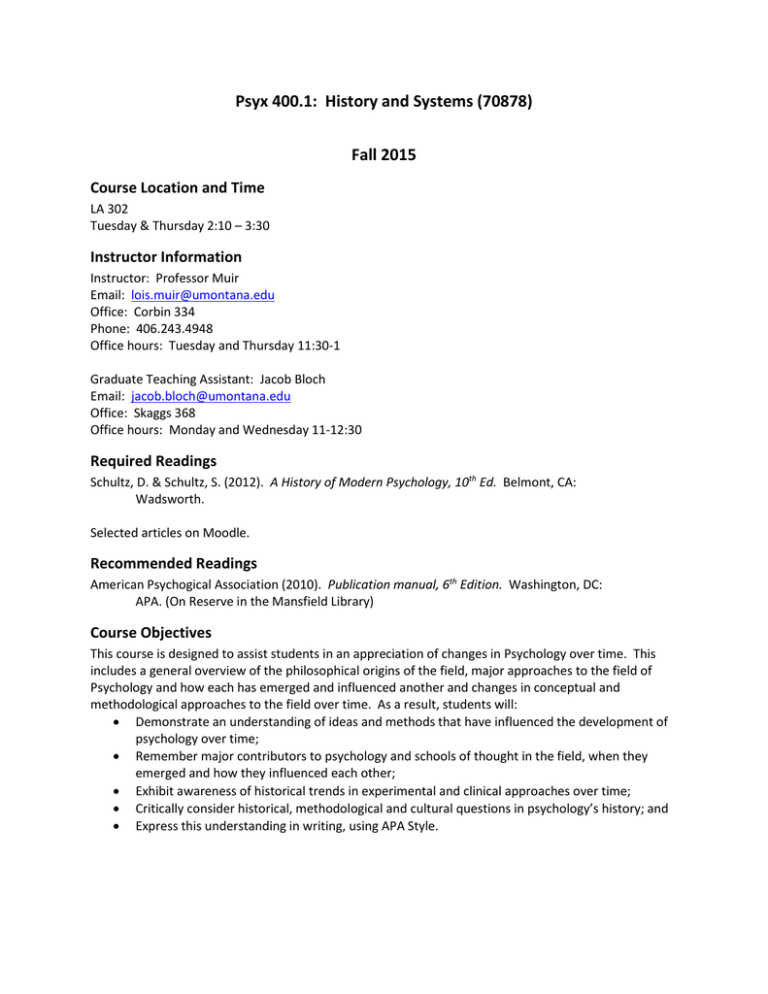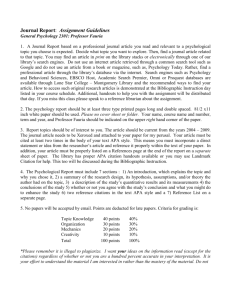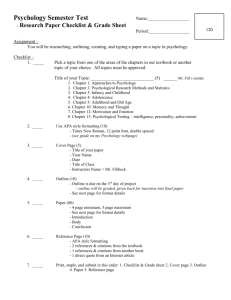Psyx 400.1: History and Systems (70878)
advertisement

Psyx 400.1: History and Systems (70878) Fall 2015 Course Location and Time LA 302 Tuesday & Thursday 2:10 – 3:30 Instructor Information Instructor: Professor Muir Email: lois.muir@umontana.edu Office: Corbin 334 Phone: 406.243.4948 Office hours: Tuesday and Thursday 11:30-1 Graduate Teaching Assistant: Jacob Bloch Email: jacob.bloch@umontana.edu Office: Skaggs 368 Office hours: Monday and Wednesday 11-12:30 Required Readings Schultz, D. & Schultz, S. (2012). A History of Modern Psychology, 10th Ed. Belmont, CA: Wadsworth. Selected articles on Moodle. Recommended Readings American Psychogical Association (2010). Publication manual, 6th Edition. Washington, DC: APA. (On Reserve in the Mansfield Library) Course Objectives This course is designed to assist students in an appreciation of changes in Psychology over time. This includes a general overview of the philosophical origins of the field, major approaches to the field of Psychology and how each has emerged and influenced another and changes in conceptual and methodological approaches to the field over time. As a result, students will: Demonstrate an understanding of ideas and methods that have influenced the development of psychology over time; Remember major contributors to psychology and schools of thought in the field, when they emerged and how they influenced each other; Exhibit awareness of historical trends in experimental and clinical approaches over time; Critically consider historical, methodological and cultural questions in psychology’s history; and Express this understanding in writing, using APA Style. Course Requirements The course will be taught with a combination of seminar and lecture that includes small group activities. Class attendance, participation, and the ability to work cooperatively and productively in small groups is important to the successful completion of the course. Students are expected to arrive on time and remain for the entire class period since it is disruptive to the class to arrive late or leave early. There are three quizzes, a midterm and a final exam based upon class material and reading assignments. There are two reaction papers and a semester paper that are required. Students may review their exams or assignments within one week of the posting of the score. The syllabus, assigned articles, course notices, and grades will be posted on the Moodle Course Management System and books listed in the syllabus are on reserve in the Mansfield Library. You must access the online system regularly and check your university e-mail for course messages. Papers will NOT be accepted by email. Graduate student presentations Since this is a 400-level UG course, graduate students are required to do some additional work beyond that required for undergraduates. Therefore, each graduate student will select a topic to research in preparation for the presentation to the entire class. Supplemental written materials that support the oral presentation must be submitted as well. See the instructor for suggested topics and procedures. Course Guidelines and Policies Add/Drop After September 22 adviser and instructor consent is required to drop classes. After November 3 a petition to drop the course or change grading options will require Dean permission. Academic Honesty All students must practice academic honesty. Academic misconduct is subject to an academic penalty by the course instructor and/or disciplinary sanction by the University. All students need to be familiar with the Student Conduct Code. Disability Modifications The University of Montana assures equal access to instruction through collaboration between students with disabilities, instructors, and Disability Services for Students. If you think you may have a disability adversely affecting your academic performance, and you have not already registered with Disability Services, please contact Disability Services in Lommasson Center 154 or call 406.243.2243. I will work with you and Disability Services to provide an appropriate modification. Writing Assignments Since Psychology 400 satisfies the Upper Division Writing requirement, there will be a strong emphasis on developing technical, organizational and expressive skills that are necessary in effective writing. Substantial class time will be devoted to mastering details as specified by the American Psychological Association (APA), understanding issues related to plagiarism and use of the Internet, and receiving feedback about clarity and effectiveness of your writing. The Reaction Papers and the Semester Paper represent a significant proportion of your final grade in the course. The University Writing Center provides tutorials and workshops on a variety of skills needed for successful writing. Printing on both sides of the paper is encouraged. Reaction Papers Students will submit 2 short papers based on an article, which can be found in the Mansfield Library or on Moodle. One article will be used for each paper. These papers should be 4-5 pages of actual text with the first half summarizing the article read and the latter half expressing your reaction to and assessment of the content. Include a cover page. The full reference should be listed at the end using APA style; no other sources are needed for these papers. Readings include: 1. Select an article from--Sternberg, R.J. (Ed.) (2003). Psychologists defying the crowd: Stories of those who battled the establishment and won. Washington, D.C.: APA. 2. Select an article from--American Psychologist, February 1992, Vol. 47(2). Special Edition on the History of American Psychology. 3. Eagly, A.H., Eaton, A., Rose, S.M., Riger, S. & McHugh, M.C. (2012). Feminism and psychology: Analysis of a half-century of research on women and gender. American Psychologist, 67, 211230. 4. Levine, R.V. (2003). The kindness of strangers. American Scientist, 91, 226-233. Semester Paper Each student will also submit an original APA-style paper: 10-12 typewritten, double-spaced pages; font size 12 Title page, abstract and references on additional pages, are not included in the page count. Minimum of six references, none of which should be the textbook or from the Internet Your grade for this paper will be based on clarity, effectiveness of writing style, accuracy, correct use of APA style, development of a convincing and logical argument, and thoroughness of information presented. A summary of the main APA style details required for this paper will be provided. The first stage of the paper is to submit a description of your topic. This can be a detailed outline or a narrative explanation of how you plan to develop the topic. Include what questions you will attempt to address in the paper. Include a list of 4 references that you have obtained that will be used in your paper. You will then receive feedback from the Graduate Teaching Assistant who will help you fine-tune your topic and provide suggestions for additional sources. Additional information regarding the paper will be provided in class. The second stage of the paper is to submit a first draft of the paper for review and grading. Deadlines are listed on the course outline. Points will be deducted for late outlines, drafts and final papers. The third stage of the paper is to submit all the previous submissions along with the final draft. Paper Topics Select two scholars that are covered in the history of psychology. I will provide a list of possibilities on Moodle. Find readings beyond class material that provide you with additional information about each person’s research, theoretical perspective, and contributions to the field of Psychology. You may choose scholars from different theoretical perspectives or two from the same perspective at different points in time. In the term paper, you will compare and contrast their approaches and contributions and explain their differences/similarities in terms of gender, cultural or historical influences. The explanation could include advances in science and technology. DEADLINES FOR THE SUBMISSION OF PARTS OF THE SEMESTER PAPER October 20: Outline/description and initial references for paper November 3: Revised outline/description and initial references PLUS 1ST DRAFT November 24: Outline/description and initial references, 1st draft, PLUS FINAL DRAFT Course Grading Course grades will be determined by point totals, not percentages. Total possible points in the course are as follows: 2 Reaction Papers (50 points each)—100 points; Semester Paper (outline/4 references; 1st draft; final paper)—150 points; 2 (out of 3) Quizzes (25 points each—50 points (The lowest quiz score will be dropped so final grades will include only two quiz scores.); Midterm Exam—100 points; and Final Exam—100 points. Total possible points: 500. Points for final grades: 450-500—A; 400-449—B; 350-399—C; 300-349—D; below 300—F NOTE Since attendance and class participation are important aspects of this course, points may be deducted for excessive absenteeism (i.e., more than 5 absences). In addition, if a student appears not to have completed the assigned readings or fails to participate in class exercises, points may also be deducted from the final grade. Failure to complete any of the writing assignments will be considered as failure to meet the requirements of the course and can result in an F for the course. Course Outline Tuesday September 1: Course Introduction September 8: Philosophical Underpinnings Chapter 2 September 15: Physiological Underpinnings Chapter 3 September 22: Writing Center (Kelly Webster) Lilienfeld et al. e-article September 29: Physiological (continued) 1st Reaction Paper Due w/ original feedback October 6: Structuralism Chapter 5 October 13: Beginnings of Functionalism Chapter 6 2nd Reaction Paper Due October 20: Applications of Functionalism Chapter 8 TERM PAPER (outline & references) DUE October 27: Women in Psychology November 3: Behaviorism Chapter 10; TERM PAPER (1st draft) DUE November 10: QUIZ 2 November 17: Psychoanalysis Chapter 13 November 24: Cognitive Psychology Chapter 15; TERM PAPER (final) DUE December 1: Developmental Psychology Bretherton e-article December 8: Psychology Today December 17 (3:20 – 4:00): FINAL EXAM Thursday September 3: Ancient Conceptualizations Chapter 1 September 10: Philosophical (continued) September 17: Library Research (Adrienne Alger) APA Style Exercise September 24: 1st Reaction Paper for class feedback—bring 2 copies October 1: Beginnings of Psychology Chapter 4 October 8: Quiz 1 October 15: Functionalism Chapter 7 October 22: MIDTERM EXAM October 29: Early Behaviorism Chapter 9 November 5: Later Behaviorism Chapter 11 November 12: Gestalt Psychology Chapter 12 November 19: Later Psychoanalysis Chapter 14 November 26: Thanksgiving NO CLASS December 3: Clinical Psychology Szasz e-article December 10: Quiz 3




